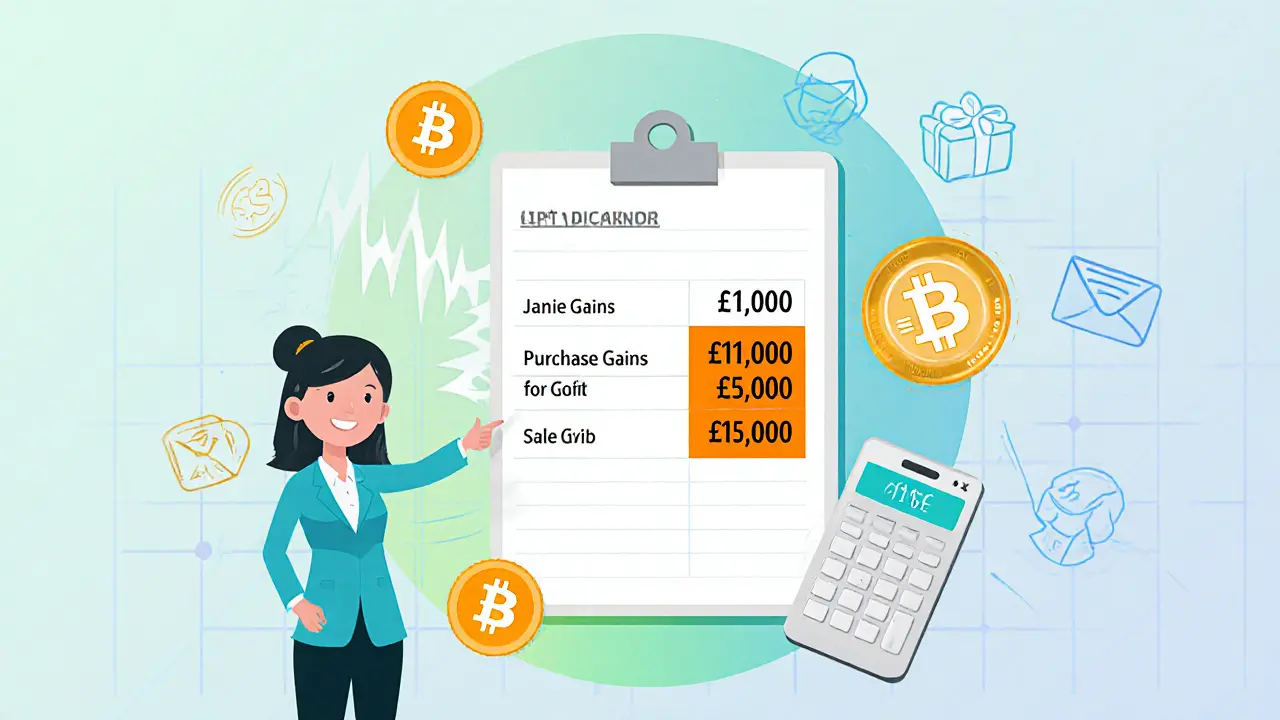UK Crypto Capital Gains Tax Calculator
Calculate Your Crypto Tax Liability
Based on the UK tax rules effective from October 30, 2024
Crypto investors in Britain are staring at a new, tougher tax landscape. With the Autumn Budget of October 2024 slashing the Capital Gains Tax exemption and bumping rates, the UK crypto tax burden can feel like a maze. This guide pulls apart the two main regimes - Capital Gains Tax (CGT) and Income Tax - and shows you step‑by‑step how to stay compliant, avoid the most common traps, and pick the right tools.
What the UK tax authority actually says about crypto
Crypto taxation in the UK is the set of rules issued by Her Majesty's Revenue and Customs (HMRC) that treats digital assets as "crypto‑assets" rather than foreign currency. The 2018 HMRC guidance classified most crypto holdings as capital assets, meaning they fall under CGT unless the activity looks more like regular earnings - mining, staking, airdrops, or payment for services - which triggers Income Tax. The latest changes, effective from 30 Oct 2024, reduced the annual CGT exemption to £3,000 and raised rates to 18 % for basic‑rate earners and 24 % for higher‑rate earners.
Capital Gains Tax: When a crypto disposal becomes taxable
A "disposal" covers selling crypto for fiat, swapping one token for another, using crypto to buy goods, or gifting it (except to a spouse). Each disposal must be matched against its acquisition cost to calculate the gain.
- Identify the trigger: Any of the events above after 30 Oct 2024 is a taxable disposal.
- Calculate the gain: Gain = proceeds - acquisition cost - allowable fees.
- Apply the allowance: The first £3,000 of total gains in a tax year is tax‑free.
- Apply the rate: 18 % if your total taxable income (including gains) stays below £50,270; otherwise 24 %.
Example: Jane bought 0.5 BTC for £10,000 in Jan 2023 and sold it for £15,000 in Mar 2025. Her gain is £5,000. After the £3,000 exemption, £2,000 is taxable. If Jane’s other income is £30,000, she pays 18 % on the £2,000 - £360.
Income Tax: Earnings that aren’t capital gains
HMRC treats crypto received as income the same way it treats salary or freelance fees. The key activities are:
- Mining: The fair market value of newly minted coins when they enter your wallet is taxable income.
- Staking rewards: The value at receipt date counts as earnings.
- Airdrops: If you receive free tokens that have market value, that value is taxable.
- Payment for services: Using crypto as payment is taxed at the market value on the day you receive it.
Income Tax rates range from 20 % to 45 % depending on your total taxable income, with a personal allowance of £12,570 for the 2024/25 year. Unlike CGT, there’s no specific crypto allowance - the whole amount is added to your other income.
Reporting: How to get it onto your Self‑Assessment return
HMRC requires record‑keeping for every transaction: acquisition date, cost, disposal date, proceeds, and any fees. These details are entered on the Capital Gains Tax Summary (SA108) and the main Self‑Assessment form (SA100).
- Gather CSV or Excel exports from each exchange.
- Match disposals to acquisitions using the “same‑day” or “bed‑and‑breakfast” rules (no re‑buy within 30 days).
- Calculate gains or losses per asset, aggregate them, and apply the £3,000 exemption.
- Enter total taxable gains on SA108, and any crypto‑income on the “Other income” section of SA100.
- Submit by 31 Jan following the tax year (which runs 6 Apr-5 Apr).
Capital losses can be carried forward indefinitely to offset future gains, but they cannot reduce Income Tax liabilities.

Common pitfalls and how to dodge them
Even experienced traders slip up. Here are the top traps and quick fixes.
- Assuming swaps are free: Exchanging ETH for SOL is a disposal, so you owe CGT on any gain.
- Gifts under the allowance: Giving £4,000 worth of crypto still counts as a disposal. If the total yearly gain exceeds £3,000, you’ll owe CGT.
- Ignoring the same‑day rule: Buying back a token on the same day as you sold it cancels the disposal for CGT purposes but not for Income Tax if it was a reward.
- Overlooking fees: Transaction fees reduce the gain. Keep fee records from every platform.
- Mixing fiat and stablecoins: Converting USDT to GBP still counts as a disposal; the stablecoin’s market value at conversion matters.
Use the “first‑in‑first‑out” (FIFO) method unless you can substantiate a specific identification approach - FIFO is HMRC‑accepted and easier to prove.
Tools and resources that make compliance smoother
Manual spreadsheets quickly become unmanageable. Dedicated crypto tax software can import trades, apply FIFO, and produce the SA108 summary.
| Tool | Import formats | Automatic CGT calculation | Support for Income‑Tax events | UK‑specific reporting |
|---|---|---|---|---|
| Koinly | CSV, API, exchange‑specific | Yes | Yes (mining, staking) | SA108 export |
| CoinTracker | CSV, API | Yes | Limited (staking only) | HMRC‑ready report |
| TaxBit | CSV, API | Yes | Full (mining, airdrop, payment) | SA108 & SA100 guidance |
If you have under 50 transactions, a free tier in Koinly or CoinTracker may be enough. Over 200 trades? Consider a paid plan or a chartered accountant familiar with crypto.
Looking ahead: What could change next year?
HMRC announced that from Jan 2026 all UK‑based crypto exchanges must report user transaction data directly to the tax authority, similar to the FATF Travel Rule. That will likely reduce the manual data‑gathering burden but increase scrutiny.
The FCA’s recent green‑light for crypto Exchange‑Traded Notes (ETNs) opens the door for crypto exposure inside Stocks & Shares ISAs. If you hold crypto‑ETNs within an ISA, any gains grow tax‑free up to the £20,000 annual ISA limit - a possible way to sidestep CGT altogether.
Industry chatter also mentions a possible “de‑minimis” rule that would exempt small‑value transactions (under £1,000) from reporting. Until it’s confirmed, treat every trade as a taxable event.
Staying updated means following HMRC newsletters, the FCA updates, and reputable crypto‑tax blogs. The rules evolve fast; a yearly check‑in can save you a lot of headaches.
Do I need to pay tax on crypto I bought and never sold?
No. Simply holding crypto isn’t a disposal, so CGT doesn’t apply. However, if you earned it through mining, staking, airdrops, or as payment, that value is taxable as income at the time you receive it.
How does the £3,000 CGT allowance work for multiple crypto assets?
All your crypto gains (plus gains from other assets like stocks) are added together. The first £3,000 of the total is tax‑free. If your combined gains are £5,000, you’ll be taxed on £2,000.
Can I use crypto‑tax software to file my Self‑Assessment automatically?
Most UK‑focused tools generate a ready‑to‑paste SA108 summary and a CSV for the main SA100 form. You still need to upload the figures manually in HMRC’s online portal, but the software eliminates the manual calculations.
What happens if I lose records for some trades?
HMRC expects you to provide accurate records. If you can’t reconstruct the data, you must make a reasonable estimate, disclose the uncertainty, and retain any supporting evidence you do have. Penalties increase if you deliberately omit information.
Is gifting crypto to a family member a taxable event?
Yes. Giving crypto away (except to a spouse or civil partner) is a disposal, so any gain above the cost basis is subject to CGT. The recipient may also have a CGT liability when they later sell.




Comments (12)